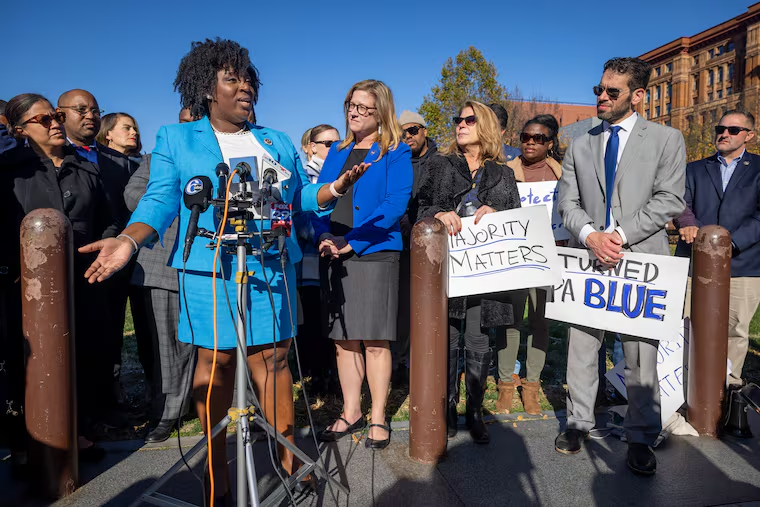Democrats won a majority of seats in the Pa. House for the first time in 12 years
The race for control of the chamber had come down to just two uncalled races: the 151st District and Bucks County’s 142nd District. Democrats needed to win only one to take a majority.

Pennsylvania Democrats won a razor-thin majority of seats in the state House of Representatives for the first time in 12 years, an unexpected victory for the party that will have a major impact on how legislation moves through Harrisburg for the next two years.
Democrats won at least 102 seats in the 203-member chamber after ballots counted in Montgomery County’s 151st District put Democrat Melissa Cerrato 59 votes ahead of incumbent Republican Rep. Todd Stephens, who conceded Thursday.
The race for control of the chamber had come down to just two uncalled races: the 151st District and Bucks County’s 142nd District. Democrats needed to win only one to take a majority.
The Republican in the Bucks County district appeared well-positioned Wednesday after elections officials counted outstanding mail ballots and provisional ballots, which are paper ballots used at polling places when poll workers are unable to immediately verify that someone should be allowed to vote.
Republican Joe Hogan, a former congressional aide, held a 53-vote lead over Democrat Mark Moffa as of Thursday night. The only ballots that remain are those that either side has indicated they might challenge in court.
Hogan’s narrow lead could be jeopardized if Democrats attempt to challenge ballots over defects such as a voter forgetting to sign the ballot. The Bucks County elections board voted Wednesday to reject those flawed ballots, and party and campaign lawyers have until Thursday to challenge that decision in county court to try to get those ballots counted.
Kevin Greenberg, an election attorney for the Bucks County Democratic Committee, said that the party had not yet decided whether it would pursue further challenges in court but that the county Democrats were committed to “protecting voter intent.”
Republicans did not declare victory. Hogan’s campaign and local Republican leaders declined to comment Wednesday at the Bucks County courthouse.
If Democrats ultimately secure a 102-seat majority, control remains precarious and could create an immediate stalemate when the newly elected House members are seated in January. Democrat Tony DeLuca died last month after ballots had already been finalized, and he was reelected in a suburban Pittsburgh district that leans Democratic.
In addition, two Allegheny County Democrats were elected to higher office — Rep. Summer Lee won a seat in Congress and Rep. Austin Davis is the lieutenant governor-elect — setting up a potentially messy few months in Harrisburg as the parties wrangle over power.
Even if Democrats have won 102 seats, they would have only 99 sitting members once Lee and Davis resign — fewer than Republicans’ 101 members.
A Democratic overperformance
The outcome represents a stunning setback for Republicans, who held a 23-seat advantage in the House coming into the election and anticipated they could maintain their grip on the legislature they’ve controlled for much of the last three decades.
» READ MORE: Why Pa. Democrats being inches from controlling the state House is significant — win or lose
While Democrats were confident they could chip away at Republicans’ majority because of new legislative maps, the national political and economic environment had been expected to strongly favor the GOP.
Instead, House Democrats picked up a dozen seats — part of a nationwide surge of Democrats outperforming expectations in state legislative races.
Democrats ousted four incumbents in the Philadelphia suburbs, flipped four open seats that had been previously held by Republicans who retired, and claimed three newly drawn districts.
Democrats have for years tried to unseat Stephens, whose district that includes Horsham and Upper Dublin has trended bluer. Joe Biden won the district with more than 60% of the vote. The party and its allies have spent millions trying to flip the seat, including when they spent about $900,000 — four times what Republicans spent — two years ago.
Stephens won then by 7 percentage points. The race in 2018, considered a banner year for Democrats, was closer. He prevailed over the Democratic challenger by fewer than a thousand votes.
Stephens narrowly lost this year by 59 votes out of more than 33,000 cast.
What a Democratic majority would mean
Control of the House is a hugely consequential electoral prize. Republicans retained control of the state Senate, and Democrat Josh Shapiro won the governor’s race, setting up at least two years of divided government in Harrisburg. Even a narrow majority in the House could affect how policy is enacted.
Democrats said control would allow them to both advance their own agenda and block GOP efforts to legislate by passing amendments to the state constitution, which must be approved by voters but cannot be vetoed. Republicans have proposed dozens of amendments in the last two years related to spending, elections, executive power, and abortion access.
Speaking in Philadelphia last week, State Rep. Joanna McClinton (D., Phila.), the House minority leader who could become the first female speaker of the House in state history, said the victory represented a rebuke of the Republican Party’s positions on abortion and its alignment with those who deny the results of the 2020 election.
“Pennsylvania voters rejected, overwhelmingly, fear,” she said. “Pennsylvania voters overwhelmingly rejected hatred. Pennsylvania voters overwhelmingly rejected division.”
